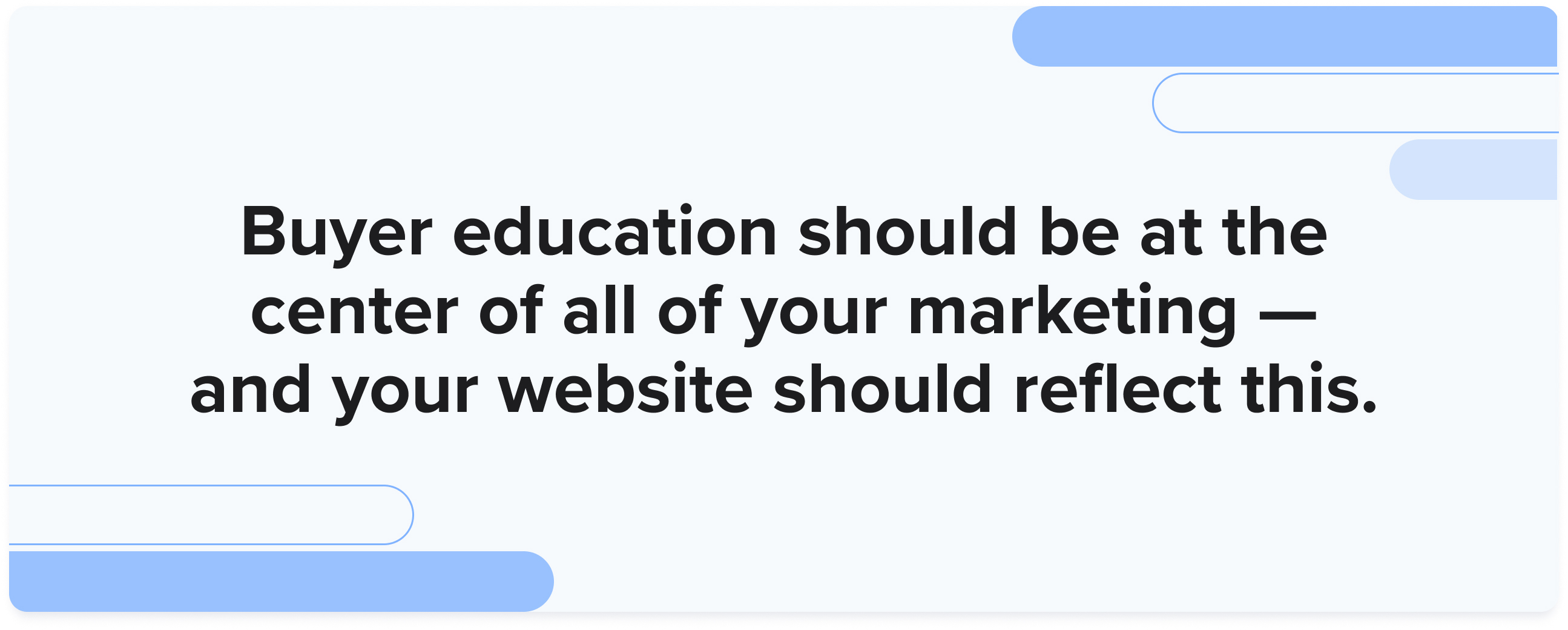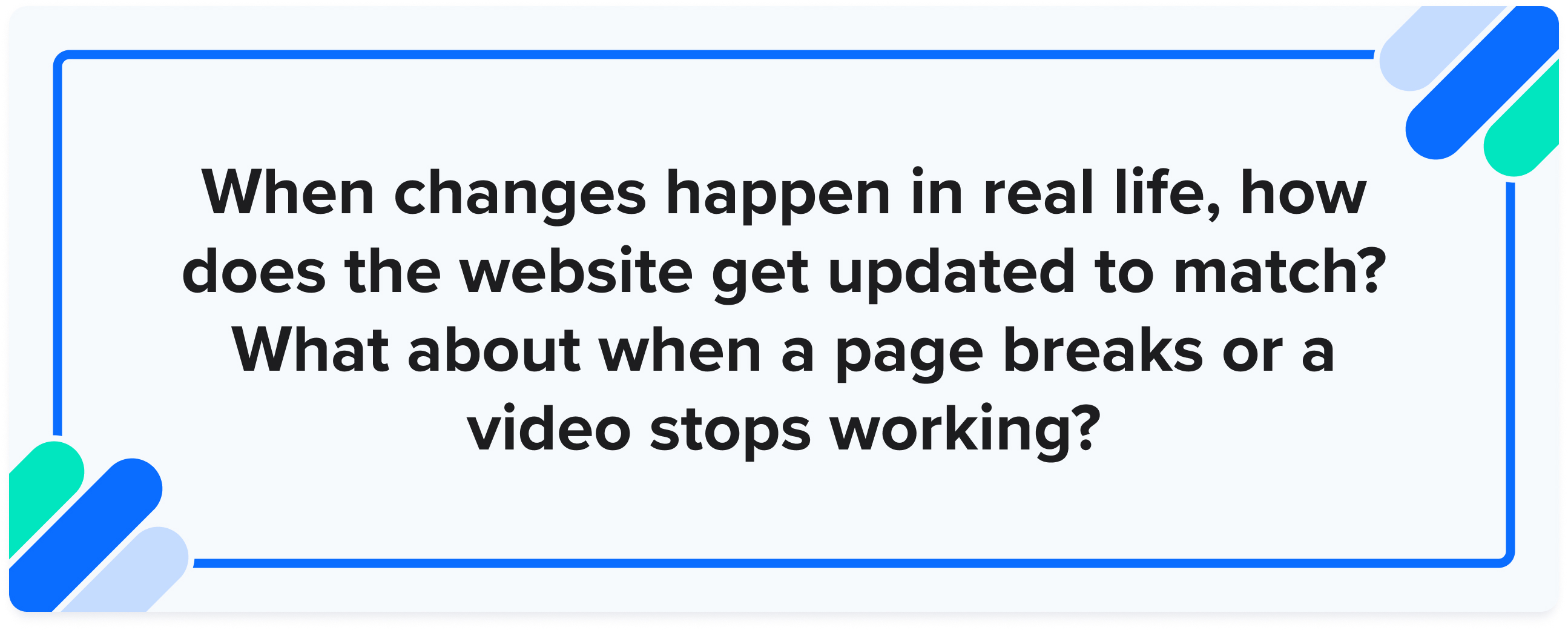Topics:
Web DesignSubscribe now and get the latest podcast releases delivered straight to your inbox.
Some business leaders agonize over every detail of their homepage. Others just see their website as a nice-to-have ‘digital billboard’, but nothing to lose sleep over.
But most are somewhere between: They know a great website is important to their growth, but maybe they’re not totally sure what exactly makes a website great.
We get it.
We’ve heard a thousand different website experts have a thousand different takes on what you need. Which makes for a lot of contradiction and a lot of noise.
We believe that a website is vital to every business, and a great website can be the difference between growth and stagnation.
So, what makes a website great? Our criteria are simple.
- A website must educate your customers
- A website must be easy to update
That’s it. End of story.
If your website doesn’t do these two things, it’s not a great website, no matter how flashy the animation and how sleek the designs.
And if you want to make your website great, you’ve got two boxes to check.
Let’s talk about it.
Criteria #1: A great website educates its visitors
Buyer education should be at the center of all of your marketing — and your website should reflect this.
Think about the last time you made a major purchase. I want you to go back to before you actually made the decision to buy. Back when you were a potential customer looking through options. What made you move forward and become ready to buy?
Every day, in every industry, potential buyers become actual buyers. What makes them take that step? It’s the same thing every time: Information.

Think about your own example. That last big purchase. Information allowed you (or maybe compelled you) to move forward. You got answers to your questions. You found information that addressed your concerns. You heard a testimonial that really spoke to you.
The information customers need is pretty consistent from industry to industry. Buyers everywhere want to know about the same few things:
- Price: What they should expect to pay — and what makes that number go up or down
- Drawbacks: What the potential downsides are of whatever they’re buying
- Comparisons: So they can put a few options next to each other to each other
- Reviews: Candid feedback from real customers
The problem is, most websites are scant on this kind of information. Instead of a real price, you get “call for quote.” Instead of actual product reviews you get a cherry-picked 5-star love fest.
In other words, most websites do a terrible job at their most important task. They don’t really educate visitors so they can become customers.
The first thing you can do to get the website your customers want has nothing to do with sitemaps or UX. It’s committing to being honest and building trust with your audience.
Commit to providing the information they’re looking for.
Criteria #2: A great website is easy to update
If a website is only as good as its content, that content needs to be up to date. The best websites can be tinkered, tested, and expanded without having to find an agency or a freelancer.
If you don’t own your website, someone else does
Your business changes every day. New people, new products, new service lines.Heck, maybe new hours and new locations.
Does your current website reflect your current business?
When changes happen in real life, how does the website get updated to match? What about when a page breaks or a video stops working?
If you’re committed to buyer education, how do you add new content? How do you update older pages?

To keep their site up to date, a lot of businesses have to call up the agency that built their site. Or they use a rotation of freelancers. Or they have someone on retainer.
This means too many businesses out there are stuck with websites that don’t really feel like theirs. They have to run and find someone for help every time something needs updating.
A website can quickly become a liability
An outdated or broken webpage is a liability. If customers come across incorrect prices or a video that doesn’t play, they make assumptions about your business.
The more complex your site, the more there is to keep up with.
Owning your own website
When you take control of your own website, you’re no longer stuck having to outsource your expertise.
Whether you’re in the market for a new site or not, there are important steps you can take to make sure you own your own website.
- Learn about your CMS. When you’re looking to design a new website, ask a lot of questions about the CMS (content management system) the website will be built on. Today, more and more CMS platforms are highly flexible, allowing non-coders to make updates. But if you don’t ask, most agencies won’t make CMS flexibility a priority.
If you’ve already got a site you like, talk to the people who built it to learn all you can.
- Track the data that matters. Even without backend capabilities, you can track a lot of important data in Google Analytics and Search Console, as well as with paid tools like Semrush and Lucky Orange. The more information you have about traffic, conversions, site health, backlinks, and UX, the better you can know where to put your efforts. You can’t make good decisions without good data.
- Give someone responsibility. Remember, if no one owns something, it won’t get done. Take whatever’s important about your website and make someone responsible for it. Give them the time and resources they need to keep your website in tip top shape. If they need training, provide it!
- Focus on training. Most websites today are made with modules that can be moved, duplicated, and customized. A lot of this work can be done without the ability to code. You can turn a tech-minded employee into your go-to web person with a bit of training — but don’t just pile more responsibilities onto someone with an already full plate. That’s a recipe for burnout.
- Never think of your website as “finished.” Your business is dynamic — and your website should be, too, filled with up-to-date company details and new content. Adopt a mindset that sees the website as a living thing that’s always being tested and improved.
The website you (and your buyers) need
A website can be an engine for growth or a frustrating liability — depending on your approach and your mindset.
At IMPACT, we teach our clients that a website is, first and foremost, a learning resource for your visitors. We believe that educational content will build trust with your audience and help you stand out in your industry.
But committing to buyer education is committing to a website that’s always growing and expanding. This means you must actively manage your site, testing, tweaking, and evaluating along the way.
When you do this, you can own your own website.
Free: Assessment
